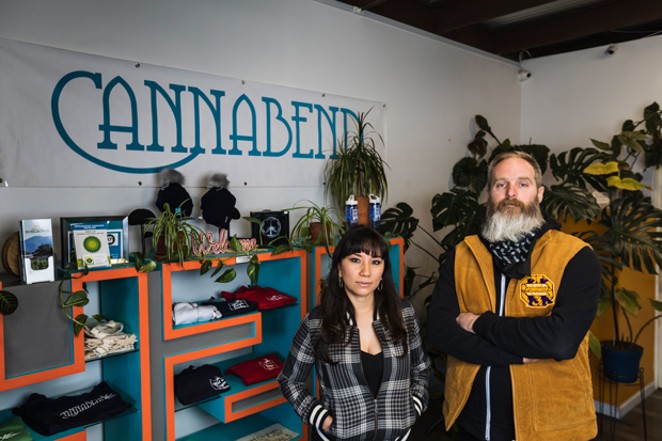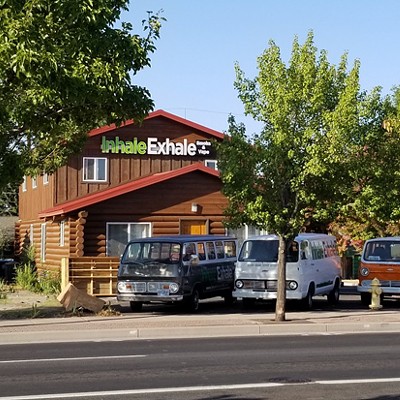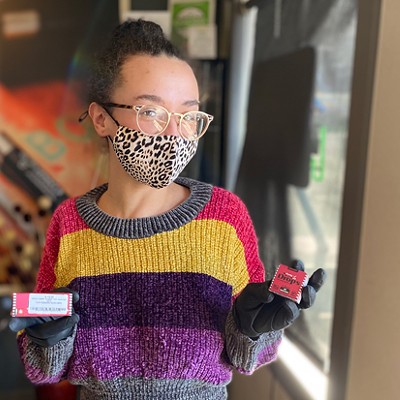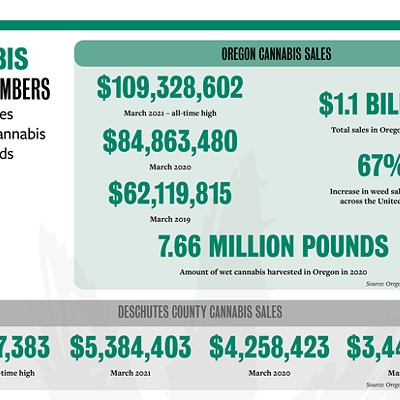If it hasn't been the giant green elephant in the room over the last several decades, let's let our second attempt at the roaring '20s be the catalyst to bury the hatchet and finally digest the fact that cannabis is shaping the world around us. Take a journey from Bend to Redmond in the late summer and you can't miss the gorgeous and almost unbelievable sight of massive, green, lush fields of hemp in abundant supply—and that's not to mention the indoor grows that supply the stuff that offers psychotropic effects.
The future is now—so let's adjust our eyes to the simulation and reap the benefits provided to the region by this biblical plant. There are more than 600 legally registered cannabis retail locations in the state of Oregon, sourcing pharmaceutical alternatives to the community and employing thousands. Weed could be worse for Bend—but it's not always rainbows and sunshine, either.
Some local industry veterans offer some insight to what's going on in the massive industry.
Lizette and Lyle Coppinger are land owners, business owners and a power couple with three children who have built a premier dispensary in Bend— a dream accomplished with the help of their late business partner Ron Koch, tragically taken by cancer and survived by his wife, Cindy, who continues a role of the third partner. Their brand oozes authenticity and attention to detail. Art and music are encrusted in Cannabend's DNA, which allows their influence to span beyond cannabis into the outer realms of human consciousness.
In an interview, I asked Lizette how their family ended up deciding to settle in Bend and start a cannabis company.
"Lyle grew up in Portland and would vacation often with his family in Bend," Lizette explained. "Naturally, he loved Bend and wanted to eventually call it home. While we were dating, Lyle was chasing snow and we ended up moving to Bend together in 2001/02. After a couple of years, we moved back to Portland to continue our careers. We knew we always wanted to come back to Bend and settle, so we made plans to move when we were ready to start a family. In 2010, I got pregnant, so we moved.
"While living in Portland, Lyle was a bridge and right-of-way inspector for the City; our partner Ron was an insurance adjuster, and I was a legal interpreter and trial assistant," she continued. "One day the three of us found ourselves laid off. At the time, Lyle and I had a medical garden here in Bend and since we had no paycheck to lose, we decided to start a retail shop and production facility. Our goal was to have complete control of our garden, production and distribution, so we knew we needed to oversee operations from seed to sale. We invited our best friend Ron to join us on this venture and he accepted, so the three of us became equal partners. Cannabis was not as accepted back then—so it was a difficult time when we had to tell our families about the change of direction we were taking in our lives."
“In the big scheme of things, we are concerned that new laws will only benefit large companies and corporations, forcing smaller businesses like us to shut down because we cannot afford new imposed taxes that only multi-million dollar companies can afford.—Lizette Coppinger
tweet this
When asked if the cannabis industry is moving in a positive direction here in Oregon, Lizette shared, "It seems we are always teetering on one end or another. We have to be really careful about what federal legalization really means and what the consequences might be. In the big scheme of things, we are concerned that new laws will only benefit large companies and corporations, forcing smaller businesses like us to shut down because we cannot afford new imposed taxes that only multi-million-dollar companies can afford. In Central Oregon, Deschutes County recently reversed its decision to allow cannabis businesses to operate outside city limits. This decision hurt many businesses including ourselves, who lost significant investments."
For the Coppingers, the transition from medical marijuana to recreational to more widespread use requires more education and openness.
"It is all about education. If you are a cannabis consumer, don't go out of your way to hide it," she advised. "Instead, teach them that there is a time and place for everything just as you should with alcohol. It is important for us to normalize the use of cannabis so that both kids and adults can be well informed instead of fearing it."
As someone who's been in the business long before it was widely accepted, Lizette also has words of wisdom for those looking to forge a career path in legal cannabis.
"Respect the plant, the planet and respect the consumers. If you work in the industry, you carry a big responsibility for what you put into the market," she said. "If you are a consumer, ask questions, find out where your product is sourced from and what type of practices a company has. Not all cannabis is grown the same and it is very important to know what we are putting into our bodies. For many companies, their only goal is profit. Also, be aware of the high cost of regulation and implementation and what that really means for your business. It is a mistake to come in thinking you can make quick money. The cost of operation is very high."
But while there's lots to learn, there are also payoffs for being a cannabis entrepreneur.
"We have an opportunity to set a standard for quality of what goes into the market—ethically and responsibly."






















